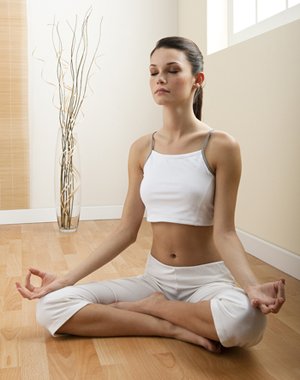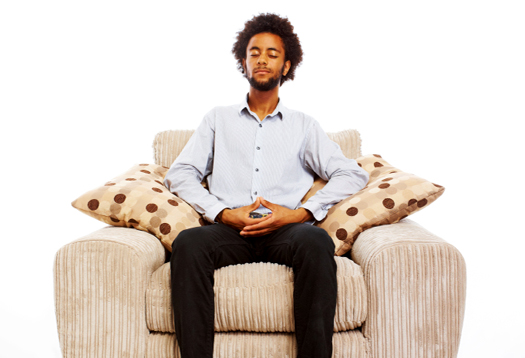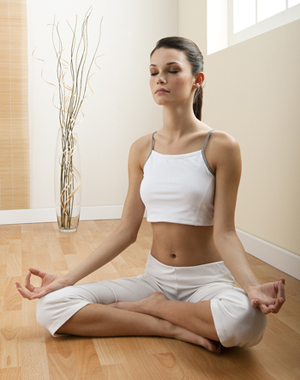How to Meditation Guide
Now that you understand what you stand to gain from mediating, let’s take a look at how to mediate. There are countless methods, but I will tell you what I personally think is the best and most practical way to mediate. For starters, how long should you mediate for? This mostly depends on your schedule, taking just a few minutes a day is better than skipping an entire day. But, if you have the time… it’s best to take your age and mediate for that long. This may seem arbitrary, but it’s not, typically the older you are the more time you need to mediate. So if you’re 25 years old, mediate for 25 minutes. At the least, try to meditate for 20 minutes or even 10 minutes a day, meditating consistently almost everyday is more important than the amount you spend each individual day. Now, what should you focus on while you’re mediating? Like most people, (including me) it’s very hard to block out all your thoughts for even one minute straight. So if you’re having this problem, the best advice is to focus your mind on your breathe. As you breathe in, feel the air entering your lungs, and as you breathe out feel the air exiting your lungs. This will calm you and take your mind away from distracting thoughts. If however, a distracting thought enters your mind… do not get angry or try to force it out. Instead, remain calm and effortlessly allow it to pass. If you focus on stopping a particular thought in your mind, you end up giving it energy and it will keep coming back. But, if you ignore the thought it will soon leave your mind. Also, you can check your body is completely relaxed by imagining a white light that goes from your head and slowly moves down to your feet, and back up again. As the light passes a part of your body, imagine that it instantly relaxes more and more. Surprisingly, this works very well to stay relaxed. Also, listening to music is optional... depends on you, but I personal enjoy sitting in a silent room and relaxing.

So now, this may sound silly… but how do you “breath” while you mediate? If you live in America (like I do) most people breathe very shallow breathes through their chest. This provides minimal oxygen for the brain and as you can guess is very bad for our brains to function properly. No wonder it’s commonly accepted that we under utilize our brain’s full potential. You can tell you’re breathing incorrectly if you feel you’re chest rise as you inhale. The “proper” way to breathe is through your diaphragm, so you would see your stomach expand as you inhale and shrink as you exhale. This is considered taking a deep full breathe. Try it right now, breathe in through your nose so that you feel your stomach expands (you can place your hand on your stomach to get a better feel for this) hold your breath for a few seconds before you exhale and then repeat. It’s important that you do this very slowly, inhale slowly, pause for a few seconds, and then exhale slowly. Try doing this a few times before you continue reading this article, so you have a better chance of remembering the proper way of breathing. Now another thing you could do is as you inhale and your stomach rises, you notice that you can switch to now breathe in through your chest and actually take in some more oxygen. I've notices that this allows you to exhale a lot more effortlessly (since more oxygen is being pushed out of your lungs) and since it gets more oxygen in your lungs it’s good for your brain. However, too much of anything is bad… I typically switch between inhaling through my stomach, then chest and just inhaling through my chest, otherwise I might get a bit light-headed. On a side note, another method of breathing is called purging… this is when you take rapid, short breathes in order to get all the carbon-dioxide out of your blood system. People that try to hold their breath for very long times will do this, because your blood is filled with clean oxygen requiring you to not have to breath as much.


Now you know what to do with your mind and your breathing while you mediate, but how do you position your body? Although the typical image of mediation is someone sitting on the floor with their legs crossed, I have discovered something very important about this. This position HURTS. For some people it’s easy to sit like this for long periods of time, but for most people our legs are not that flexible. The point of mediation is to be relaxed and calm. For me, this is impossible if I bend my legs the way a typical image of mediation shows. So I recommend the next best thing, sitting down in a chair. I will typically mediate sitting on the edge of my bed after I wake up (maybe shower first so I’m more awake). I don’t believe there is any difference at all in terms of the quality of your mediation experience. Some people even recommend you to lay down in your bed as long as you’re comfortable, but the problem as I found here is that it’s hard to stay awake. If you fall asleep while you mediate, it doesn’t count. You have to be fully aware of yourself and everything around you while you mediate… it’s this act that you’re consciously training your mind to be “silent” and yet aware. The one thing I will say is that posture is very important. Your mind will mimic your body, so if you slouch or lean your back against the back of the chair, your mind will become lazy as well. In china they train their kids to mediate with a straight upright back, if they begin to slouch they will get hit on their backs to correct it.
Now what is the best time of day to mediate? That’s up to you depending on your schedule. It is possible to even mediate while you’re driving to work. If you consciously keep any distracting thoughts out of your mind it counts. The key to mediating while keeping your eyes open is to not focus on any detail. This is why it’s easier to mediate with your eyes closed. One more thing I will say about this, is that with a “silent” mind as you observe something and it catches your eye, you appreciate it more if you don’t use words to describe it in your head… for instance, if you see a red car that looks amazing don’t think of any words to describe it (like “beautiful” or “red”) just feel the feeling of enjoying looking at it without focusing on the details. If you do that you will notice something interesting right away, kind of like you get to the core of why you appreciate it for what it is. Back on the topic, I mentioned that I will try to mediate in the morning… this is because you have the most energy when the sun is up. Men and women have more testosterone in the morning. This is why people go to the gym in the morning, from my experience you’re literally a bit stronger and also this is why some people like to have sex early in the morning. We naturally are not meant to work when the sun goes down, although it is possible to train our bodies to work best at night for whatever reason. (I have experience with this too) The last thing I will say about this is try not to mediate at night… if you do make sure the room is fully lit. I don’t know this for sure, but read that mediating at night in the dark may attract bad spirits… I would rather not find out if this is true or not personally. Who knows what is what in this world.


The last advice I have for mediation is hand position. You can comfortably rest your hands on your upper thighs as you mediate, but there are some other things you do with your hands do have a better mediation experience. Please click here to watch this YouTube video to get a better understanding of what you could do with your hands, than I can explain through text. I’ve experimented with a few of these and I actually do feel like it helps and does what the guy says in the video. It’s interesting to note, that typically when I mediate (regardless of my hands) my mind feels like it’s tingling at some points… as if energy or a small amount of electricity is passing through it. If you experience this don’t be afraid, it’s not bad at all. To learn more about this though, please click here.
Wisdom-Square › Spirituality and Health › How to Meditation Guide




